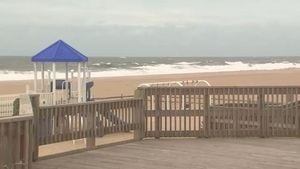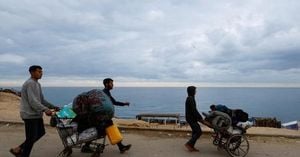Ontario's colleges are facing unprecedented challenges this year, as several institutions announce program suspensions and staff layoffs largely caused by the federal government's cap on international student enrollments. Colleges like Fanshawe, Loyalist, and St. Lawrence have unveiled significant changes, affecting students and faculty alike.
Fanshawe College, based in London, Ontario, is currently conducting a thorough review to assess the impacts of the cap on its international student population—approximately 11,700 permits were approved for the college this year alone. These numbers, unfortunately, are expected to plummet, with estimates indicating a cut of around 5,000 students. The college had anticipated reductions of 47% and 39% in its January and May intakes.
Kyle Rooks, spokesperson for Fanshawe College, stated, "We're being deliberate and careful to... communicate to our Fanshawe community." The results of this review, carried out by StrategyCorp and funded by the province, are expected to provide clarity on the college's future by March. Currently, the broader college community feels the ripple effects of these changes, prompting uncertainty about their programs.
Loyalist College, located in Belleville, has also confirmed radical changes, suspending admission for about 30% of its post-secondary programs beginning Fall 2025. Communications director Hannah Brown noted, "We are implementing indefinite intake suspensions for approximately 30% of our post-secondary programs..." Alongside these suspensions, the college aims to reduce its staff complement by 20% as it grapples with anticipated revenue losses of $40 million this fiscal year alone due to decreased international student enrollment.
This has set off alarm bells across the province, with the situation at St. Lawrence College reflecting similar struggles. President and CEO Glenn Vollebregt announced the suspension of 55 programs next semester, which includes 40% of its overall offerings. With international enrollments dropping from 1,600 to only 775 new students this year, Vollebregt expressed concern over federal policy stating, "Many of the changes were short-sighted and did not take our unique needs and situations around student education and community growth fully to account."
The extensive cuts will impact programs across all three of St. Lawrence's campuses, covering Kingston, Brockville, and Cornwall. Cuts to programs such as culinary management and hospitality services reveal the depth of this crisis—both significant fields for job growth and community building.
Even with all these cuts, Loyalist College still aims to grow by adding fresh courses like pharmacy technician and acupuncture programs. This indicates there’s still some effort to adapt to changing educational demands, even amid cutbacks. Brown emphasized, "Despite the cuts, we are witnessing some growth." This resilience is echoed by local community members who see the colleges as cornerstones of educational growth.
Across Ontario, these changes raise many questions about the future of higher education and the role of international students. Local leaders express concern about the long-term impacts of these policies, with Mayor Matt Wren of Brockville supporting St. Lawrence College’s initiatives to preserve its campus and operations. He notes, “We support St. Lawrence College and their efforts here.”
This situation reflects broader issues surrounding educational funding and immigrant integration policies, as well as the local economic impacts expected from declines in international enrollment. The speed at which these policies have rolled out leaves international students feeling overwhelmed. Many who once had pathways paved toward permanent residence now find themselves at crossroads.
Community members have voiced their confusion over the rapid changes, with one local journalist mentioning the lack of public discourse concerning these suspensions, indicating possible awareness among staff but not the general public. “It seems... the broader public is not really being brought...into those conversations,” said Hannah Theodore, editor of the campus newspaper at Fanshawe.
This turbulent period poses significant decisions for college administrators, students, and staff moving forward. Will these institutions be able to navigate these financial hardships and emerge intact, or will they have to make even more drastic cuts? The answers remain uncertain as these colleges respond to both changing immigration policies and the corresponding economic consequences.
With enrollment declines affecting not just students but faculty jobs and course offerings, the need for transparent communication from these colleges has never been more apparent. Stakeholders and the community alike are left hoping for a way forward amid the shifting tides of the education system.



